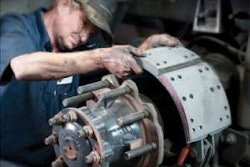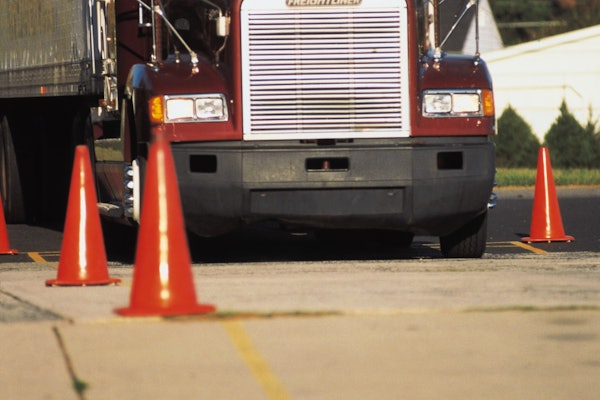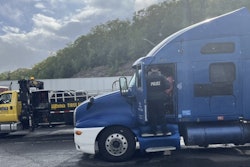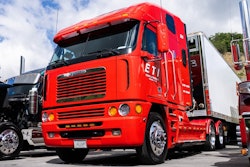An open discussion between seasoned veterans and emerging drivers dispels some age stereotypes
Word on the street is that old-school truckers view the younger generation as mechanically inept, technology-addicted, bad-attitude slackers who consider trucking nothing more than guiding a vehicle to a paycheck. The young truckers see the old-timers as smug, condescending, out of touch with technology and unwilling to lift a finger to help them out in a bind.
Rick Hodge trained truckers ages 23-73 for Oregon Truck Co. and says he found many of the stereotypes are true, though there are always exceptions. “For the most part, older drivers appear to be more insecure about the peripherals of trucking, such as paperwork and the changes in the industry coming down due to CSA 2010,” Hodge says. “Younger drivers seem to be more cocky with an ‘I know it all’ attitude but have a harder time driving. I have also noticed that neither group wants to adjust to the new ways that are coming due to CSA 2010.”
Do generational stereotypes apply to all drivers? We chose seven truckers, based solely on their ages, to participate in a roundtable conference call about the differences across the decades. The youngest driver, Jayme Snow, 24, was far from the stereotypical bad-attitude young driver, and John Bryant, 56 (who was interviewed separately because he was unable to attend the conference call), was definitely not the burned-out, techno-stupid old-timer. The 30-somethings, Chad, Trucker Steve and Chris, could see both sides of the debate. Kathy and Lacey* brought their experienced/female perspective to the table. You can draw your own conclusions from the conversation that’s re-capped (and edited for length) here. Ages are noted in parentheses at first reference.

*Name has been changed at request of driver due to a domestic situation.
Generational stereotypes
Newbies
Bad attitude
Poor driving skills
Look at trucking as a job, not a career
Non-professional attire
Distrustful toward old-timers
Trash talking on CB
Technologically savvy
Bad work ethic
More business-oriented
Like flashier equipment
Roundtable Discussion
Attitude
Truckers News: Do you view trucking as a job, a career or a hobby?
Chad (31): I would have to say that I look at my job more as a hobby. This is what I’ve always wanted to do. I love doing what I’m doing. I’ve turned it into a career and a professional business, and every day that I go to work, I feel like I’m still doing my hobby. My grandfather had a livestock trucking business, so I was kind of raised with some of the old-school guys. We wear nice, starched pants, nice boots and a nice button-up shirt.
Chris (35): I look at trucking as a way to make a living and support my family. I think the attitude out here is to go to work every day and make a dollar and go home and relax. I think some of the older truckers may have the attitude of “I’ve been there, done that, and I don’t have to do it again,” and some of the younger guys are coming out of school with the attitude “I was trained by a trainer, and you don’t have to tell me no different.”
Trucker Steve (31): Trucking’s definitely a career for me. I’m a third-generation truck driver. Everyone in my family drives. Everybody that I know, pretty much, drives. It is what you make it. It can be a lot of fun, or it can be a lot of work. I think there are a lot of people in the industry who are bitter, but I don’t think trucking has changed as much as a lot of people think it has. You know, everyone’s responsible for their own happiness out here.
John (56): Trucking is a profession for me. I think some of the new-school drivers don’t look at it as anything more than a job. I enjoy what I do. It’s just getting harder and harder, especially with the new laws in [CSA] 2010. I still love what I do. I don’t think the young guys love it, though. I think they look at it more as a job, that they couldn’t do anything else and they came out to drive truck.
Jayme (24): I’m in livestock hauling, too, and by all means I look at it as my hobby. I told my dad when I was in the fifth grade that I was going to drive a truck when I turned 18. It’s always been a dream for me, so I look at it every day as I get to do my hobby. I work lots of long hours, and I work really hard to get to do what I do. Even when I was a kid, I enjoyed listening to the older drivers, because they were always talking about how they did it in the good old days.
Kathy (49): This was a safety valve for me, and I made it a career. I do see an attitude difference between the older and the younger generation, and I can say this also from the standpoint of having been a trainer. I’m a female, and I hear it all the time: “You don’t know what you’re doing” and “You don’t know how to do this because you’re female.” I find a lot of the attitude toward us is “Leave me alone, you’re a female, and I don’t want your help.” And this is not just from the younger generation.
Lacey (47): It’s a job. That’s all it is. It’s a job.
Knights of the highway no more?
TN: Do you think the old-school guys are willing to help the new-school guys out?
Chris: No. Seven or eight years ago, if you were backing up into a parking spot, it would be nothing for an older guy to go over and help you. But not anymore. The older guys sit back and watch. The same thing goes for the young guys. Nobody helps anyone.
John: Well, I always used to ask if a struggling driver needed help and was happy to do it. But these days, I’d say most of the time they either tell you they don’t need your help or, if you do give them a hand, most of them don’t even bother saying thank you.
Chris: I think the younger guys are afraid to ask for help because then they won’t feel as smart as some of the older people out here. They don’t want to feel like the newbie out here, so they won’t ask the questions.
Jayme: I hate to stereotype, but I do hear a lot of the freight drivers that say that they’ve been trucking for 40 years, and all these new guys are idiots, and the trainees are idiots. I see the maturity level of my generation decline, which frustrates the older drivers to the point where they say, “You’re just another new guy. Get out of my way.” And then that’s where the breakdown begins, because the older guys don’t want to talk to the young guy because he’s a newbie. And the new guy doesn’t want to ask a question of the old guy because he’s going to look like an idiot. So, you know, they’re canceling each other out.
Entitled or ‘working smarter’?
TN: Old-school drivers believe the young guns don’t have the same work ethic they do. How would you describe your work ethic?
Chad: I would say I’m an overachiever.
Chris: (laughing) I’ve got a very strong work ethic, and I consider myself a highly sophisticated, professional freight relocator/agent/specialist-in-training out here.
Trucker Steve: I have a strong work ethic. At the same time, I think some of the best things that happen to us happen outside of the truck, so I play just as hard as I work.
Jayme: Oh, I think I have a very strong work ethic.
Kathy: I have a very strong work ethic. I can outwork the younger generation and most of the older one as well!
John: My work ethic is that I do whatever it takes to get the job done. Young guys are trained as machines: Run your 11 hours, shut down.
Lacey: I think it depends on my mood of the day!
Technological know-how
TN: How tech savvy are you?
Chris: I use the CB. I don’t have a laptop in the truck. I’m not very tech-savvy. I’ve got the CB on about a third of the time.
Trucker Steve: I’m a very technological truck driver. I have just about everything you can imagine in a truck. I come from a technology background. I keep the CB off most of the time. A lot of guys fight and complain, and I think really that’s part of the downfall of the trucking industry, or at least the public’s perception of the trucking industry. That’s bad, too, because you miss hearing a lot of the camaraderie between truckers and how they really feel for each other. But I’m an old-school truck driver at heart. I still use a map to plan my routes, if I even need to look. And I don’t have a GPS or anything like that, but I believe in it. I think technology is a great thing as long as you don’t become complacent with it.
Chad: I use my phone and never listen to the CB. It’s all business. I also dispatch and broker out loads, so I’m pretty much on the phone. My phone is on 24 hours a day. I have two of them. That’s pretty much all I have time for.
Jayme: I run a GPS, XM Radio, CB radio and, of course, my cell phone. I don’t have a computer in the truck for several reasons, because they’re expensive and I don’t want to tear one up. But I use my cell phone primarily for business, and I’m on it a lot. But on the other hand, I leave the [CB] radio on because I find it to be a helpful tool to alert you to road hazards and various obstacles that other drivers can see that maybe you’re not gonna see until you get up on it. I also use the GPS as a guide — not for planning routes. I’m also old-school in the fact that I do all of my route-planning with maps.
Lacey: I think we’ve got too much technology out there. They’ve made everything so easy that the driver doesn’t think anymore. They don’t know how to read an atlas. They don’t know how to plan routes. They’ve never had to do anything. All they have to do is push a button, and all it says is “Go from point A to point B,” and then they watch the screen. Ask one of them how to read a map to actually figure out how to get there, they look at you like you’re stupid. They don’t use their brains enough anymore.
Trucker Steve: I have to agree with her. I have a couple of friends who have been driving for 25 years, another one for 40 years. They took a trip to Las Vegas — and these are guys that have been using GPS — and they couldn’t find their way out of a parking garage. You’re a professional driver who’s been driving for 25 years, and you don’t know how to find your way out of a parking garage without a GPS?
Kathy: Well, I’m a second-generation trucker, and I grew up with my dad, who had the old kind of CB that looked like the telephone. I’ve always had a CB, and I listen to the AM/FM radio. I also have a computer, but I do not like the GPS, so I do not have one. I think technology is great in some instances and not great in others. I do use my laptop to keep in touch with my family. I talk to friends. I go down the road trying to do what I can to stay awake if I have to at odd hours behind the wheel. That’s not often, but when I do, I like the technology they have in the trucks today.
John: I carry a laptop with me. I communicate with family and friends/dispatch with my laptop. I’ve designed a program in Excel to keep track of my cost per mile. I depend on Google Maps for mapping. I use my cell phone a lot and watch a lot of movies. I have Sirius satellite radio and do not go on CB radio. I hate the way truckers trash-talk on the CB — some of the stuff is sickening. I don’t bother with it.
Mechanical Expertise
TN: Old-school drivers say newbies don’t know jack about mechanics. Evaluate your mechanical skills.
Chad: Well, I guess you’re only as good as you want to be. I’ve been riding in the truck since I was in diapers. I pretty much do everything. There’s nothing that I can’t do. I learned from other guys on the road. There were things that I didn’t know that I picked up by watching and listening. A lot of times I may know what’s wrong — I may not be able to fix it, but I can at least acknowledge what’s wrong.
Chris: I don’t know how to rip an engine apart and put it back together, but I can get by out here on the road. I learned from the older guys. Back years ago, if you blew a tire on the road you would have four or five guys on the road helping you out, and you learn from that. Then you sit down and you have coffee and you learn some more. I don’t think [the newer drivers] know how to do a proper pre-trip inspection, to be honest with you. You ask one of the new guys how much tire pressure to keep in there, and they say “Enough to keep it round.” I have yet to see one of the younger guys in the morning at a truckstop take the 15 minutes to check the air in their tires. And some of the older gentlemen are the same way. I know a few old-timers who have told me I’m crazy for doing that.
Trucker Steve: I have to agree with Chris. Experience is something that doesn’t happen necessarily over time. Every time I get up in the morning I do a proper pretrip beyond what they actually require to pass the test. I don’t think that has a lot to do with young or old out here. I think it has to do with your prior background, your upbringing, your previous profession. I don’t think number of years out here necessarily means experienced or not experienced, professional or not professional.
Jayme: I work on all of our own trucks. I would say I’m very mechanically inclined. I attend seminars, plus we ordered the same trucks, so we have matching transmissions, matching engines. Pretty much I learned how the system works, so I can work on any of our trucks and many others as well. But it surprises me at the age of some people, with the experience they have, that they don’t know how to figure their own fuel mileage. It’s really surprising some people’s attitudes about that. And I’m not saying it’s all generational. I carry enough tools in my truck to work on my own truck and another one. It’s my truck, and I’ve got to pay the shop bill — so I’m going to do the work myself if I can.
Kathy: I know what I’m doing. I can change a tire, I can check the oil, I can do whatever needs to be done. Of course, it often comes down to this: I’ve been out here almost 24 years. I get tired of hearing “You don’t know what you’re talking about.”
John: I would guess 50-70 percent of the young drivers don’t carry a toolbox. I am very mechanical but can’t say the same for the new drivers.
Lacey: I’m mechanical. I have learned that if you have a roll of duct tape, a paper clip, a bandana and a bra you can fix almost anything to get you to where you need to go to get help.
Generational stereotypes
Old-school
Professional, safe drivers
Good navigators
Technologically inept
Solid work ethic
Mechanically oriented
Excellent skills
Clean cut
Pride in the ride
Conduct pretrip inspections
Use CB rather than cell phone
Terrible health habits
Want to hear it for yourself? You can listen to or download the entire roundtable conversation at www.truckersnews.com.
Meet the Roundtable Participants
Jayme Snow, 24, Snow Farm Trucking, owner-operator, 6 years.
Chad Blackwell, 31, Blackwell Cattle Service, owner-operator, driving for 13 years over the road.
Stephen “Trucker Steve” Adams, 31, May Trucking, driving for 13 years OTR
Chris Mayls, 35, driver for KLI, driving for 12 years OTR
Generational opinions
A driver’s take on the generation that’s not his own
I think most of them are inexperienced. They don’t get enough training before they put them on the road. You can’t learn to drive a truck in four weeks. They just put them out there too young, and they don’t know what they’re doing.
— Charles French, 66, Dyersburg, Tenn., leased to Tennessee Steel Hauler
[Younger drivers have] no respect for the rules of the road. We’re not talking about DOT rules. We’re not talking about company rules. There’s an etiquette on the road. And they either don’t want to use them or they don’t, period. Maybe they haven’t learned them or maybe they haven’t talked to older drivers. In the old days, like when I first came into trucking, you gather around, you know, you go into a restaurant and you hear stories and you want to hear them. Now this new generation that’s in, 28 into their upper teens, they don’t want to hear these stories. [Gathering] is a lost art.
In the old days you’d see a truck on side of the road and eight trucks would pull up alongside of him. This guy would have tools, this guy would have knowledge, this guy would have coffee, and they’d get that guy on the road. The younger generation, they shift lanes and keep going.
— Bill Perkins, 58, West Point, Ga., leased to Steelman Transportation
Back in the days they didn’t have that much safety precaution like they do now. The federal regulations are strict on a lot of these trucks right now for one thing, to make it more safe on the road. The older guys, they don’t like the new rules as it is now. It helps us out, and it’s good for us. [Before it was] the more miles you turn, the more money you get — well now you can’t really do that. You have to go by the rules and regulations now.
— Anthony Jackson, 33, Greensboro, Ala., leased to A&P Trucking
The biggest thing is they harp on the young drivers a lot. They think we don’t know what we’re doing. They think we just don’t have a clue, like we’re just in the wrong business. And some of them think that they should move the age up to be a truck driver. They still feel like we’re a liability, like we’re still some young teenager. But I feel like I can accomplish it just as good as an older man can. I do just as good of a job as they do, I feel like.
— Parbin Williams, 22, Dothan, Ala., company driver for TransAm
Trainer Point of View
Rick Hodge of Central Oregon Truck Co. trained flatbed drivers of various ages for six years. Here’s what he observed as a trainer:
Work ethic: “I have found that older drivers are more driven to working hard, and younger drivers tend to be more geared to having fun. There does seem to be a group of the newest drivers that appear to be reverting to the hard work ethic of the past. I have found older drivers usually dress better but are also more likely to let personal hygiene fall by the wayside to get a few more miles. The middle of the road age (30 to 45) dress more like bikers, but are usually clean. They appear rough with longer hair and beards, but are clean. The younger drivers are more likely to wear slogan and derogatory shirts, but are clean.
Mechanical skills: “Mechanical skills definitely are stronger with the older drivers. They seem to have more of a problem-solving mind than the younger drivers. Younger drivers are more likely to take someone’s word on how to fix something. I do believe this comes from companies who do not want drivers to ‘turn wrenches.’ “
Technology: “Younger drivers are more technologically savvy, but I do find it true that more young drivers do not know how to read a map and get themselves in trouble because they followed their Garmin. A GPS unit can be a very useful tool if someone knows how to use it in conjunction with a good old-fashioned atlas. The younger group is also more likely to miss appointments because they got caught up playing online video games.”
Professional: “Those who have spent time (more than four years) in the military tend to be hard workers and have a strong will to do things by the book, or in this case the company manual. They also tend to be the most professional in attire and manner, and know how to use technical breakthroughs with good old fashioned and proven ways of driving.”












